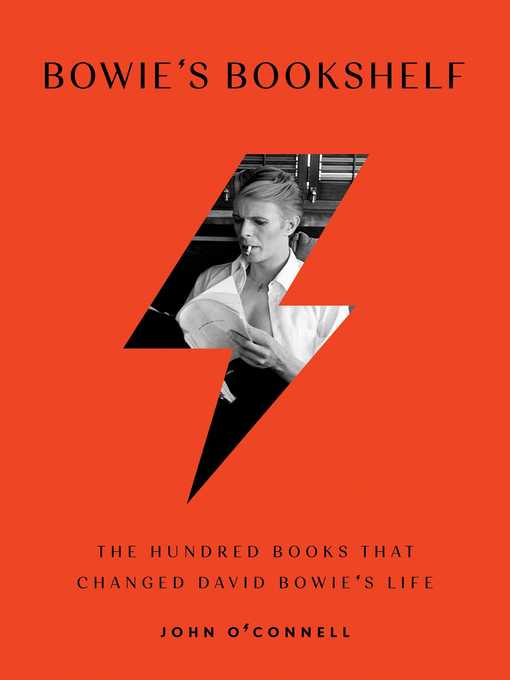
Bowie's Bookshelf
The Hundred Books that Changed David Bowie's Life
کتاب های مرتبط
- اطلاعات
- نقد و بررسی
- دیدگاه کاربران
نقد و بررسی

September 15, 2019
A peek into the psyche of one of rock's most inscrutable figures through the books that had the strongest impact on him. In 2013, London's Victoria & Albert Museum hosted an exhibition, "David Bowie Is," for which the star drafted a list of the 100 books that had influenced him. O'Connell, a veteran music journalist, gamely delivers brief essays on each title, with context on what influence Bowie might have drawn from them. This is sometimes a tall order. Many of Bowie's selections speak to his obvious passion for music, especially early rock 'n' roll and R&B (Greil Marcus, Gerri Hershey), his famous Japanophilia (Yukio Mishima, Tadanori Yokoo), and his stint in Germany (Alfred Döblin, Otto Friedrich). There are a few surprising anecdotes--e.g., Alberto Denti di Pirajno's obscure 1956 memoir, A Grave for a Dolphin directly inspired Bowie's classic song "Heroes." But many of Bowie's selections don't lend themselves to such cause-and-effect treatment. The best O'Connell can make of Bowie's affection for Frank Norris' McTeague and William Faulkner's As I Lay Dying is that teeth feature prominently and Bowie had dental implants; he can only speculate that Giuseppe Tomasi di Lampedusa's novel The Leopard appealed for its story of a giant in decline. That straining for meaning suggests that this project might better have been approached thematically rather than book by book. Exploring Bowie's interest in transgressive literature by Hubert Selby, Mikhail Bulgakov, Jack Kerouac, and John Rechy needn't require extensive plot summaries of each novel; numerous books on divided selves speak collectively to Bowie's career-long shape-shifting (and his late schizophrenic half brother). Still, O'Connell's approach does underscore the range and playfulness in Bowie's reading, from hefty tomes on the Russian Revolution to laddish comic books like The Beano. An enlightening if imperfectly conceived look at Bowie's eclectic bookshelf.
COPYRIGHT(2019) Kirkus Reviews, ALL RIGHTS RESERVED.

January 10, 2020
Three years before he died, chameleon performer David Bowie (1947-2016) made a list of 100 books that changed his life, from pulp fiction and Japanese novels to art and philosophy texts to humor magazines, cartoons, and black magic tomes. O'Connell, former Time Out senior editor and music columnist for the Face, peruses those titles in this collection of breezy essays. The author displays a breadth of knowledge not just about Bowie's life and his music but also the authors and genres on the list. Each short chapter examines a different work's effect on Bowie. Occasionally, O'Connell makes assumptions about when Bowie read a book--chapters in which he supplies quotes from the singer/songwriter are stronger--but his thoughts on how Bowie transformed practically everything he consumed into his stage personae are insightful.
VERDICT With illustrations and suggestions for read-alikes and Bowie songs to listen to while reading each book, this is a fun peek at what stirred and shaped a legend. For Bowie fans and devotees of offbeat reading guides.--Liz French, Library Journal
Copyright 2020 Library Journal, LLC Used with permission.

Starred review from November 1, 2019
O'Connell's diligently documented book on the literary influences on David Bowie is a fantastic voyage into 100 books that inspired his prodigious output. Basing his research on a list that Bowie provided three years before his death and which runs from poetry to comics, James Baldwin to Anthony Burgess, O'Connell analyzes each book, explaining its core themes, cultural and literary impacts, and what part it played in Bowie's musical development. O'Connell's introduction is informative and crucial in framing Bowie's library; it's also very entertaining. For Bowie enthusiasts, it fills in gaps of fandom knowledge with tales, for example, about how, when Bowie landed in New Mexico to film The Man Who Fell to Earth, he was stick-thin and in the grip of a severe cocaine addiction." In 1978 Bowie tells Crawdaddy that he had vivid nightmares . . . enormous bugs flying . . . and other creepy-crawly dreams after reading Kafka's The Metamorphosis. Books were so important to Bowie that he had custom-built luggage-bookshelves made to carry his traveling library. This exciting book chronicles the literary influences on a revered and visionary bibliophile artist.(Reprinted with permission of Booklist, copyright 2019, American Library Association.)

























دیدگاه کاربران